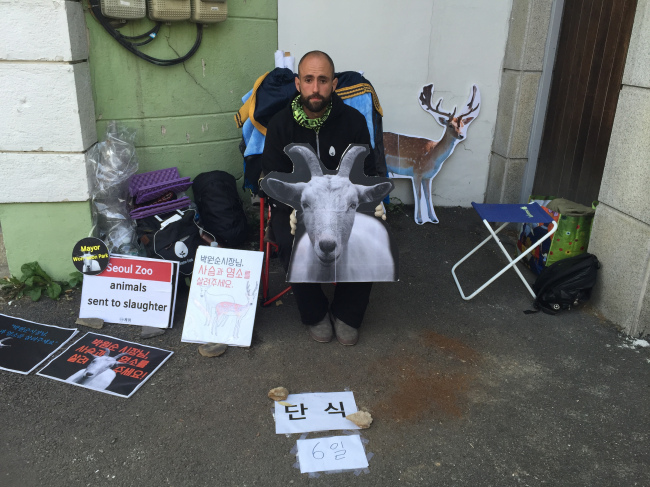Wearing a winter coat and holding a picture of black sheep, a U.S. citizen has been staging a hunger strike in front of the Seoul mayor’s residence in central Seoul since last week. His demand to the mayor is simple: Stop selling public zoo animals to slaughterers.
A.J. Garcia, U.S. branch president of civic group Coexistence of Animal Rights on Earth, argues that Seoul City is using the overpopulation of animals as a means to draw profits. The Seoul Metropolitan Government runs the Seoul Zoo to the south of the capital in Gwacheon, Gyeonggi Province.
 |
A.J. Garcia stages a hunger strike Wednesday for the sixth day in front of the Seoul mayor’s residence in central Seoul. (Lee Hyun-jeong/The Korea Herald) |
“What Seoul Zoo does is that it sells any animals, including dogs, at auction and lets anyone buy them. It has become profits for the zoo. It doesn’t properly check where they are selling to. This is insane,” the 30-year-old told The Korea Herald on Wednesday.
His battle with the city started in August when CARE officials found that dozens of deer and black goats from the Seoul Zoo were being taken to a slaughterhouse after being put up for auction. One black goat was immediately slaughtered on the first day, CARE said.
The hunger strike was the last option left for him to save the animals, Garcia said.
“We kept asked the city to take action for two months, but nothing changed,” he said, adding that the mayor has yet to acknowledge him, though he has been sitting next to the door of his residence for six days.
Seoul Zoo, however, flatly denied Garcia’s claim.
“In August, the zoo sold the animals to one who didn’t have anything to do with the slaughterhouse. But the first buyer apparently resold them to a slaughterhouse,” a zoo official said.
Seoul Zoo has regularly put excess animals up at auction once or twice a year since 1986 to control the number of animals.
It also refuted the claim that the animal sales were for business purposes, saying that it was to control the number of animals.
In the case of other countries, such as the U.S. or some European states, contraception or euthanasia is often used to control the number of “surplus” animals in the limited space.
“The zoo’s annual budget is around 18 billion won ($15.9 million). It drew only about 15 million won for the animal sales this year. Earning such an amount from the auction gives little financial help,” the official added.
The animal rights activists urged the zoo to buy back the animals, but it refused the demand, citing insufficient space.
The official stressed that the zoo is currently rearranging animal types as part of a restructuring plan released last year. In the long term, the zoo is aiming only to focus on endangered species and native animals, officials said.
Acknowledging the concerns over animals being sent to slaughterhouses, however, the zoo vowed to map out a guideline to prevent similar cases and limit the eligibility of auction participants.
By Lee Hyun-jeong (
rene@heraldcorp.com)








